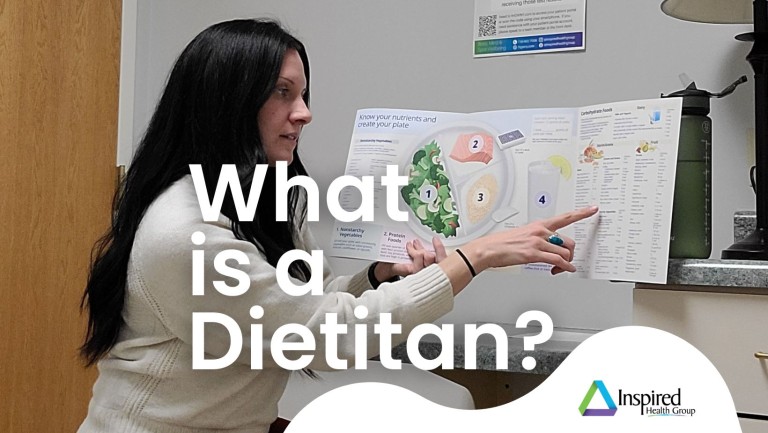Do you have a health condition or disease that could be treated through diet? Learn how a Dietitian can support you through healthy lifestyle changes to improve your health and wellbeing.
Join us as we shine a light on Medical Nutrition Therapy options offered at Inspired Health Group. Registered Dietitian Nutritionist, Nicole Moretta, explains the role of a Dietitian, and how they can help you treat or manage health conditions and diseases through diet.
What is a Dietitian?
If you have been recommended to see a Dietitian, you probably have questions about what a Dietitian is and what they can do for you. A Dietitian is a clinician who specializes in treating or managing conditions and diseases through diet. This treatment is called Medical Nutrition Therapy. Some common conditions that are treated through medical nutrition therapy are type 2 diabetes, kidney disease, heart disease, hypertension, and certain GI conditions, such as Celiac disease. Some people will visit a dietitian because they are not sure how to eat for their specific condition(s), such as people with food allergies, IBS, or prediabetes. Your dietitian wants to help you learn the skills you need to make healthy choices on your own, so they will rarely provide you with a prescribed diet plan. Instead, they will set small goals with you to get you making changes independently. Sometimes your dietitian will work with you to set basic exercise goals as well.
What is a visit with a dietitian like?
While some people will get what they need at their first visit, most people will meet with their dietitian over the course of 6 months to a year, depending on their goals. In general, your first visit with a dietitian will be mostly investigation. You will be asked a lot of questions about your diet and lifestyle, your diet history, medical history, family history, and your goals for your time together. At your first visit, your dietitian may make simple recommendations for you to try at home, and will ask you to return to evaluate how those changes are working for you. Dietitians know it can be difficult to make long-term changes to your lifestyle, so they generally walk you through small steps to change and help you work through barriers as they come up.
To be prepared for your visit with your dietitian, it is helpful to track what you are eating for a few days before your visit. Bring your food journal to your meeting so you can remember what you’ve been eating. It’s also important to be honest with your dietitian about what changes you can make at home. If you are struggling to make changes, communicate with your dietitian so your goals can be adjusted. Medical nutrition therapy can be beneficial to many people, but it is not a quick fix. To get the best results, it’s important to make consistent changes over time. Working with a dietitian can help you manage your chronic conditions through diet, and can help you stay on track for long-term success.
FAQ:
What is the difference between a dietitian and a nutritionist?
All dietitians are nutritionists, not all nutritionists are dietitians. A dietitian has the credential RDN, which qualifies them to give nutrition advice to treat a specific condition (such as diabetes). A nutritionist without the credential RDN can provide basic healthy eating advice, but is not qualified to give recommendations to manage a specific disease. You may find nutritionists who are not dietitians at gyms, restaurants, or out in the community. Dietitians are generally found in medical settings such as hospitals, doctor’s offices, and clinics. Dietitians are considered health care providers and can accept insurance for qualifying services.
Will my insurance cover my visit to a dietitian?
Every insurance plan offers different coverage. Some people may have coverage for any visit to a dietitian, but most people will only have coverage if they have a certain diagnosis such as diabetes or end stage renal disease. Call your insurance company to find out what your plan covers.
How long do visits last?
Generally, your first visit will be about an hour in length. Follow up visits are shorter and last about 30 minutes. After your initial visit, your dietitian may request to follow up soon after, maybe in 2 weeks or a month. As you get more comfortable with your new dietary changes, you may follow up every 3 to 6 months, or may go an entire year before you return. You will set your ideal schedule with your dietitian.
Does a dietitian adjust my medications?
No. A dietitian will ask you about your medications to identify nutrient interactions, but they will not make recommendations or adjustments to your medications. Your dietitian will probably discuss your progress with your doctor so your doctor can adjust your medications if necessary. Your dietitian may also make recommendations about nutritional supplements and dosages of nutrients, or may ask your provider for testing to confirm suspected nutrient deficiencies or toxicities.
- Nicole Moretta, MS, RD, CDN,
Registered Dietitian Nutritionist at Inspired Health Group

